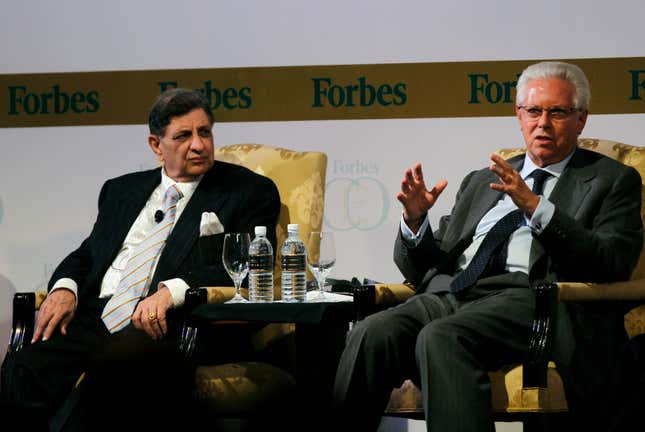Any news surrounding the coronavirus vaccine conjures up images of scientists in masks and gloves, holding a glass vial. In India, that image is soon followed by horses at a chic ranch.
This is because India’s vaccine initiative is almost inseparable from the man behind it. Adar Poonawalla, CEO of vaccine maker Serum Institute of India, pledged his support for the AstraZeneca-University of Oxford vaccine, way back when the trials were in their first phase.
In what has since become his trademark bold demeanour, he decided that his company will manufacture 1 billion doses of the Covid-19 vaccine, whenever it is ready for market. His investment towards this goal—$250 million (Rs1,845 crore)—put him on the Covid-19 vaccine map, and as India’s most prominent face in the race to procure adequate, affordable vaccine shots.
This proclamation to manufacture the vaccine may seem par for the course now that the Oxford endeavour has shown promising results. But back when large parts of the world were still under lockdown, Poonawalla’s optimism for the vaccine appeared both far-fetched and brazen. That, though, shouldn’t come as a surprise.
As one of the largest vaccine makers by volume in the world, the bets made by his company, earlier led by his father Cyrus Poonawalla, have paid off rather well. And the picture of horses instead of a liquid vial has a lot to do with it.
The Poonawallas who bred horses
The 39-year-old CEO joined the business in 2001 after graduating from the University of Westminster, as a member of the sales team. It was his father—now the sixth richest Indian—who created the pharmaceutical empire from the ground up.
The Poonawalla family had inherited roughly 40 acres of land in what is now the city of Pune in the western Indian state of Maharashtra, which Soli, Adar’s grandfather, converted into the Poonawalla Stud Farms in 1946. They bred racehorses, Thoroughbreds that won the farm various accolades and world records.
But it was mere chance that Cyrus stumbled upon the idea of venturing into the vaccine business. He met a veterinarian in the 1960s, who spoke to him about how retired racehorses were donated to government medical facilities for vaccine research. Cyrus then discovered that the horses their farm-bred held immense potential for creating antibodies and serums for vaccines—something that could eventually be used for the mass market.
He began researching to see how the Poonawalla horses could be used to create vaccines for tetanus and anti-venom shots for snake bites. This was done by injecting the horses with small amounts of the bacteria or poisons, and extracting the antibodies that they subsequently created.
Thus was born Serum Institute of India in 1966, with Cryus’s investment of $12,000, money that he raised by selling a few of his horses.

Now, in 2020, Adar quipped to The Washington Post that one of his sternest critics, his father, had this to say about his $250 million Covid-19 vaccine bet: “Look, it’s your money. If you want to blow it up, fine.”
But those who have worked closely with Adar say that these bets are carefully calculated, and in no way should his personal flamboyance be mistaken for the lack of business acumen, a report in Business Standard newspaper noted.
A case in point of his vision for the company is when he joined the Serum Institute board of directors in 2005-06, the company was supplying vaccines to only 35 countries. But because of Adar’s strategy to magnify this global reach, according to his personal website, Serum Institute began supplying vaccines to over 150 countries by 2015.
Today, the Poonawalla’s not only hold the lion’s share of the vaccine industry, they are counted among India’s richest social elites.
The high and the mighty
The young Poonawallas—Adar and his wife Natasha—often host soirees at their palatial home in south Mumbai, which includes the who’s who of the film, design, and business world. Among their friends are top Bollywood stars, including actors Kareena Kapoor Khan and Sonam Kapoor Ahuja.
The couple often goes from rugged ranch boots into tuxedos and ball gowns for the most sought-after galas in the world, though, of course, in the pre-Covid-19 era. Natasha, for instance, is a regular attendee of the Met Gala in New York.
Adar, almost predictably, featured on GQ India’s 40 Under 40 list this September.
As with horses, they are connoisseurs of luxury cars, too. To ferry them around the world, the Poonawallas have a customised Airbus A320 private jet, which has a 10-person boardroom, a bedroom, and an elevator. According to a Bloomberg report, it cost $1 million to remodel the aircraft, a cost Adar shrugged away as “nothing.”
In the larger scheme of the family fortune—$11.5 billion in net worth—the jet remodelling may very well be nothing. After all, the Poonawallas did also buy a two-acre home in 2015 in Mumbai for $120 million, mostly for weekend visits.
And Adar, it seems, is aware of how much attention their lifestyle gets. “In terms of public perception, we’ve been known more for our lifestyle; now people understand the work we do. I’m grateful for that,” he told GQ magazine in an interview.
He also believes that the Covid-19 vaccine is a calling, even if it prevents him from a holiday in France. In the GQ interview, he said if not for the pandemic, he would be “in Cannes, on a yacht, sailing down the coast with my family, watching the Grand Prix, attending the film festival and spending time with friends there…I suppose I’m a little sad we’re not there at the moment. But the excitement and joy that comes with what I’m doing right now more than compensates. This really is a once-in-a lifetime opportunity.”
If the vaccine is a success, it’ll more than make up for a missed Grand Prix season.
